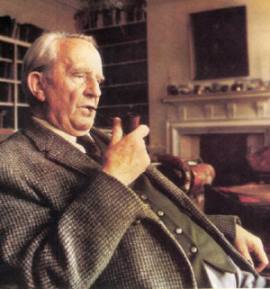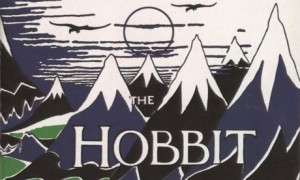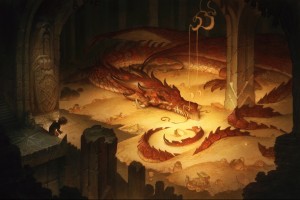 Readers who are skeptical after seeing the title of this piece have a right to be. English professors have been known to find all sorts of things in books which the authors never put there. In addition, at first glance Middle-earth seems a particularly non-religious place. We find no mention of God in The Hobbit, no prayers, Bibles, churches, priests, or ministers — none of the things typically associated with the Christian faith.
Readers who are skeptical after seeing the title of this piece have a right to be. English professors have been known to find all sorts of things in books which the authors never put there. In addition, at first glance Middle-earth seems a particularly non-religious place. We find no mention of God in The Hobbit, no prayers, Bibles, churches, priests, or ministers — none of the things typically associated with the Christian faith.
Fans also know Tolkien was a Professor of Anglo-Saxon and that his writings were influenced by the myths of Northern Europe which he and his friend, C. S. Lewis, loved to read aloud with the circle of friends that later grew into their famous writing group, the Inklings.
So how might it be claimed that The Hobbit is a Christian story?
The Hobbit: an essentially Christian story?
A TORn Library feature by Devin Brown
Professor of English, Asbury University
Author of The Christian World of The Hobbit
First off, we have the author’s own statements — though not many of them.
Tolkien was, in some ways, the opposite of Lewis. While Lewis published apologetic works like Mere Christianity and intentionally made the faith elements in his fiction clear and direct, Tolkien made little public statement about his spiritual convictions. This is not to say he took his faith less seriously. In fact, Tolkien played a key role—some would say the key role — in bringing Lewis, who had been an atheist, to belief in Christianity. Tolkien was not less committed than Lewis, just more reticent, making those rare times he spoke about the role his faith played in his fiction all the more significant.
One of these times can be found in a letter Tolkien wrote to Deborah Webster on October 25, 1958. Webster, an American academic, was preparing a talk on the author and since at that time there was little biographical material available, had written with a few questions. In his reply, Tolkien made a distinction between those facts which are significant and those which are not. Among the “really significant” facts about himself was his faith. “I am a Christian,” he wrote and added in parentheses “which can be deduced from my stories.”
 Here the word deduced is key, making it clear that the Christian aspect in Tolkien’s stories is present but not directly evident and must be deduced. In addition, the author tells us it can be deduced from the stories themselves, not something else. While Tolkien’s lectures, essays, and letters can shed additional light on the Christian nature of his fiction, if we look below the surface, Tolkien tells us we can find it in or deduce it from the stories alone.
Here the word deduced is key, making it clear that the Christian aspect in Tolkien’s stories is present but not directly evident and must be deduced. In addition, the author tells us it can be deduced from the stories themselves, not something else. While Tolkien’s lectures, essays, and letters can shed additional light on the Christian nature of his fiction, if we look below the surface, Tolkien tells us we can find it in or deduce it from the stories alone.
In an interview, Tolkien told the American scholar Clyde Kilby, “I am a Christian and of course what I write will be from that essential viewpoint.” Here, Tolkien uses the word essential to suggest that his writings — The Hobbit and The Lord of the Rings — are in their essence or at their core, Christian works, but only at their core, not on the surface. The Christian viewpoint, and Tolkien’s own words tell us he has included one, has been embedded into the story.
The most famous statement Tolkien made about his fiction came in a letter to his friend Robert Murray, who had read and commented on early drafts of The Lord of the Rings. In this letter, dated December 2, 1953, we find the author’s often-quoted declaration: “The Lord of the Rings is of course a fundamentally religious and Catholic work; unconsciously so at first, but consciously in the revision.”
Remarks such as these make it clear that at the very least it is not absurd to claim that Tolkien’s faith had a discernable, fundamental impact on his fiction. While a number of Christian elements can be found in The Hobbit, three of the most important are its Christian sense of purpose, its Christian sense of Providence, and its Christian sense of morality.
Tolkien’s contemporaries — writers such as Sartre, Beckett, and Camus — show us characters whose lives have no meaning or purpose other than what they themselves invent. By contrast, Bilbo is chosen for a specific purpose — one he did not create and even rejects at first. Whoever sent Gandalf to the doorstep of Bag End has not intended that Bilbo continue to live a life surrounded and bounded by comfort, security, and predictable dinner times. Though it may seem incredible, the diminutive Mr. Baggins — and no other — is meant to help the dwarves regain their home and restore the Desolation of Smaug. In helping others, Bilbo himself will be helped. The two purposes are indivisibly intertwined. At the start of the adventure, Gandalf promises Bilbo that the adventure will be very good for him and profitable, too. In the end, Bilbo returns, not with one-fourteenth of the dragon’s hoard, but with a very different kind of treasure—one that thieves cannot break in and steal.
If in The Hobbit we find a special sense of purpose Christians can identify with, we also find a Christian sense of Providence which also can be traced to Tolkien’s view of the world. If a beginning creative writing student had handed in a story where so much seemed to depend on coincidence — Elrond’s holding up the map in just the right moonlight, Bilbo being in just the right place to find the ring, the dwarves and hobbit being at the doorstep to Lonely Mountain at just the right time for the keyhole to appear — any teacher would have written at each of these occurrences, “Too much reliance on chance!” In fact, Tolkien wants readers to come to learn, as Bilbo does, that there has been an invisible hand of Providence behind these and the many other so-called lucky coincidences in the story. Tolkien, who had a lifelong belief in a personal God who works in ways mysterious to us, has Gandalf say in his final words to Bilbo: “You don’t really suppose, do you, that all your adventures and escapes were managed by mere luck, just for your sole benefit?”
If not mere luck, than what? Whoever has sent Gandalf chooses not to appear to Bilbo in a burning bush but instead works behind the scenes in ways that clearly have Bilbo’s best interests in mind and the best interests of Middle-earth as well.
 Finally, many of Tolkien’s contemporaries depicted a world where right and wrong and good and evil were merely relative terms. By contrast, in The Hobbit Bilbo finds that if he will think carefully enough, there is always a right decision to be made—whether it is to spare Gollum or give up the Arkenstone. Tolkien provides an antidote for the growing materialism of our age in the sacramental ordinary things of the Shire and reminds us that we all — even the smallest and weakest — can make a difference and we each have a role to play.
Finally, many of Tolkien’s contemporaries depicted a world where right and wrong and good and evil were merely relative terms. By contrast, in The Hobbit Bilbo finds that if he will think carefully enough, there is always a right decision to be made—whether it is to spare Gollum or give up the Arkenstone. Tolkien provides an antidote for the growing materialism of our age in the sacramental ordinary things of the Shire and reminds us that we all — even the smallest and weakest — can make a difference and we each have a role to play.
Does someone need to share Tolkien’s Christian beliefs to fully enjoy The Hobbit? Not at all. In fact, one of the defining qualities of his stories is their ability to inspire people all over the world, young and old, from many different backgrounds. It could be argued that one of the reasons Tolkien’s works have been so widely popular, both in the previous century and the current one, is because they have been so deeply needed.
Devin Brown is a Professor of English at Asbury University where he teaches a class on Lewis and Tolkien. He is author of The Christian World of The Hobbit which was released in October 2012 and is published by Abingdon Press. The views in this article are his own, and do not necessarily represent those of TheOneRing.net or its staff.


